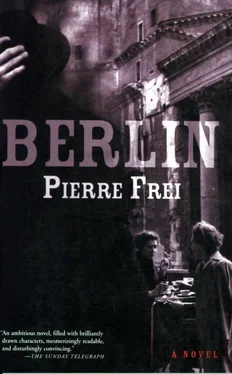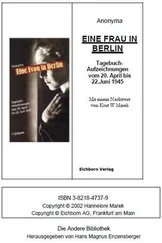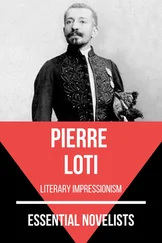'Thank you, Jana, go to bed now,' she dismissed the girl. 'We'll wash the dishes tomorrow. Goodnight.'
'Heil Hitler, Herr Commandant. Heil Hitler, Frau Neubert.'
'Nice girl.'
A prisoner like the others, don't forget that.' Fredie poured himself a cognac and leaned back comfortably in his armchair. Not bad, this house, eh?'
As long as the hedge is high enough,' she couldn't help saying.
When she went to lock the door of the house, she heard quiet weeping outside. Jana was sitting on the steps, her head between her knees. 'Hello, child, what's the matter? Don't you want to go to bed?'
The girl raised her tear-stained face. 'Sema say Frau Hauptsturmfiihrerin very angry. She wait for Jana with whip.'
'I'll go with you. She won't dare do it again if I'm there.'
Agonized black eyes looked up at her. 'When Frau Neubert gone, Frau Hauptsturmfiihrerin more angry. Then Jana have to go in with rats.'
'Come along.' She drew the girl back into the house and took her upstairs. Fredie had already gone to bed. There were a couple of mattresses in the attic. 'This will have to do for tonight. Tomorrow we'll see.'
As usual, Fredie was in a good temper at breakfast. He gave his permission for Jana to move into the house. Marlene was delighted. She cycled into the village and bought flowered linen curtains and bedlinen. They found some sticks of furniture in the attic, and she and Jana painted them pale blue. Together they refurbished the little attic bedroom.
In the afternoon she picked up the field telephone to ask Fredie if he wanted to come over for a cup of coffee. Surprised, she heard both his voice and a stranger's. He was speaking to his head office in Berlin. She hung up again at once. There was probably some problem in the temporary line, which went out of the kitchen window and then wound its way from tree to tree and over the yew hedge to the office building. She'd mention it to him.
Jana brought her an old nickel-plated alarm clock that she had found in a chest. The thing rattled fit to wake the dead. 'Well, you won't oversleep and be late for work,' Marlene teased her.
'Jana not sleep. Jana like work for Frau Neubert.' The girl flung her arms round Marlene's neck and kissed her cheek.
'Oh, what nonsense,' said Marlene, moved. 'Tell you what, I'll ask my husband if you can cycle into the village to fetch the breakfast croissants from the baker's. Can you ride a bike?'
'Not know.'
'Never mind, child, I'll teach you.'
Jana squealed when Marlene put her on the bicycle. They both had a lot of fun, and Marlene forgot all about the telephone.
You couldn't forget about the camp. It was omnipresent. When the wind blew from there towards the house, Marlene could smell it. It smelled of hunger, latrines and mortal fear, of the sweat of its inmates and the black shoe polish the slaves used to clean their masters' belts and boots.
She avoided the camp, but the camp came to her every day, when a female prisoner brought the vegetables. Then she saw not the basket of lettuce and carrots but the army of women's bent backs among the endless vegetable beds.
Fredie banned Jana's expeditions to the village, so Marlene herself cycled to Blumenau once a week to do the shopping. Conversation in the grocer's shop died away when she came in. There was suspicion, fear and hostility in the air. She felt like crying out, 'I can't help it! None of this is anything to do with me!' She didn't, offering a friendly greeting instead. Today, Friday 14 June 1940, the radio drowned out her voice. The German Army had occupied Paris.
She bought bread and butter; their rations were generous, and there was a special allocation of coffee and chocolate from looted stocks. The British had abandoned all their supplies of food in their headlong flight to the Atlantic coast.
Outside the shop, someone asked her quietly, 'Can I speak to you?' The woman was about fifty, simply dressed, holding her small handbag close to her breast. In her other hand she carried a brown paper shopping bag. She looked careworn and sick. You could only guess at the beauty that had once been hers.
'Speak to me? Why?'
'You're the commandant's wife. My name is Mascha Raab. My husband is in your camp.'
'Raab?' Marlene remembered the name. 'He had something the matter with his circulation. Dr Engel treated him.'
'He's a diabetic. They take good care of him so that he'll last a long time. Pure philanthropy.' There was no mistaking the irony in her voice.
'You are very incautious, Frau Raab. Don't forget, I'm Obersturm- bannfiihrer Neubert's wife.'
Mascha Raab lowered her handbag. A yellow Star of David with the word JEW on it came into view. 'People like me are perceptive. It's a matter of survival. I sense that I have nothing to fear from you.'
'But suppose your feelings deceive you?'
'Then you can have me imprisoned or killed. That's all. Forgive me, I didn't mean to alarm you. They won't do anything to deprive Georg of hope.' She raised her shopping bag. The neck of a bottle stuck out of it. A 1934 Chablis. Very dry, suitable for diabetics. A luxury — Jews aren't allowed such things. But the wine merchant knows us from the old days. Georg loves French wines, and today is our thirtieth wedding anniversary. Would you give him the bottle?'
'I'll ask my husband to let you have a visitor's permit as a special case.'
'No, just take Georg the bottle. Lie to him for me — say I'm looking young and healthy, tell him I'm confident that he'll soon be back with me. My train leaves in ten minutes. You're a good woman, I know you are. Goodbye.'

Fredie sat down to lunch in very good spirits. 'The Frogs are as good as done for. Now for the Tommies. What's new in the village?'
'Just imagine, a woman called Frau Raab approached me. Out of the blue! What a nerve those Jews have! Said her husband was here in the camp, and could I take him a bottle of wine for their thirtieth wedding anniversary? Well, I brought the wine back with me. What do you think?'
She had struck the right note. Fredie nodded.
'Raab is a special case. What's for lunch?'
'Veal schnitzel au naturel with cream sauce and rice. And green beans on the side.'
'Schafer can take you to Raab when we've eaten. Incidentally, I have to go away for a couple of days, to compare notes with my colleague at Buchenwald. Not a very inviting prospect, they say his wife is a terrible cook. Hurry up, Jana. I'm ravenous.'
Oberscharfiihrer Schafer was waiting for Marlene at the door beyond the yew hedge. He had taken off his peaked cap and was mopping his brow. A hot day, isn't it?' The bristly-headed man attempted a smile. He looked like the doorman of a second-class hotel hoping for a tip. He did not look like a murderer. That was the thing that made the executioners of Blumenau so terrible: they were ordinary men and women who smiled, perspired, made love, went to the lavatory and looked forward to pay day.
Schafer hit the corrugated iron with his stick. It made a hollow sound like a drum in the African bush announcing some misfortune. The guard opened the door at once and stood to attention. 'That's all right, my boy,' the Oberscharfiihrer thanked him jovially. 'This way, Frau Neubert.' He trudged towards a bungalow that stood outside the camp itself, like the office and infirmary buildings. Here too, gravel paths and well-tended flower beds would give visitors the impression that the atmosphere was one of calm and beauty. Inside, the bungalow was clean and cool. Polished, pale-grey linoleum muted the sound of Schafer's hobnailed boots. There was a door at the end of a corridor. 'Visitor for you, Raab. In you go. Frau Neubert.'
A room flooded with light, a cross between a workshop and a laboratory. A chubby little man with a white coat over the coarse, cotton uniform worn by inmates. He was wearing a Helmholtz mirror on a band around his forehead. He folded the mirror up, revealing intelligent brown eyes, and stood stiffly to attention, which looked rather comic. 'Prisoner 48659, Heil Hitler,' he said in a quiet and friendly voice.
Читать дальше













